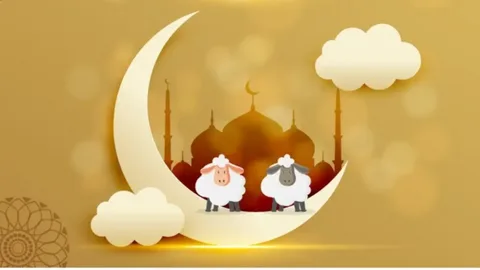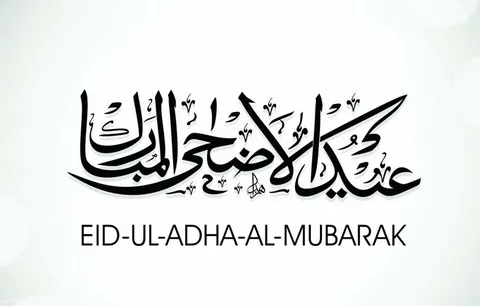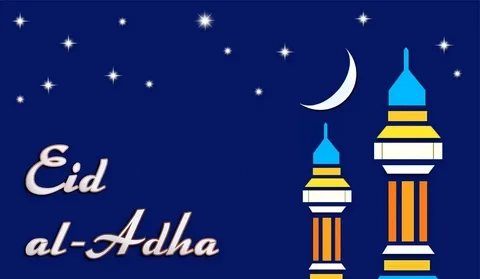eid al adha 2024, often termed the Festival of Sacrifice, is one of the most significant holidays in the Islamic calendar, celebrated by millions around the globe. It commemorates the willingness of Ibrahim (Abraham) to sacrifice his son as an act of obedience to God. However, before the sacrifice could occur, God provided a ram to sacrifice instead. This event is not just a reminder of faith and submission but also a period of joy, reflection, and community bonding.
What is Eid al-Adha?

Eid al-Adha has deep roots in Islamic tradition, linked directly to the Quranic recount of Ibrahim’s test of faith. This festival not only marks an act of great sacrifice but also underscores the importance of trust in the divine. It is celebrated on can we fast the 10th day of Dhu al-Hijjah, the last month of the Islamic lunar calendar, following the completion of the annual Holy Pilgrimage of Hajj, which is a requirement for all able Muslims.
When is Eid al Adha 2024?
The expected dates for Eid al-Adha in 2024 are likely to fall in mid-July. However, the exact date will be confirmed based on the sighting of the moon, which is used to declare the start of Dhu al-Hijjah. This sighting varies by location, leading to minor differences in celebration dates across the world.
Cultural Significance
Across the globe, Eid al-Adha is observed with various unique customs and traditions, reflecting the rich cultural diversity within the Muslim community. From the lavish feasts in Turkey to the colorful parades in Indonesia, the essence of Eid resonates with themes of generosity, piety, and community service.
Preparations for Eid al-Adha

Eid al-Adha, the Festival of Sacrifice, involves extensive preparations that encompass spiritual, practical, and communal activities. These preparations are designed to honor the spirit of the festival, which commemorates the willingness of Prophet Ibrahim (Abraham) to sacrifice his son in obedience to God’s command. Below are key aspects of how Muslims prepare for this significant occasion.
1. Spiritual Preparation
The lead-up to Eid al-Adha is a time for spiritual reflection and renewal. Many Muslims engage in increased prayer and recitation of the Quran, particularly the verses related to Prophet Ibrahim’s story of faith and sacrifice. This period is also marked by seeking forgiveness and cleansing oneself of sins.
- Fasting: Some Muslims choose to fast on the Day of Arafat, the day before Eid al-Adha, as it is believed to expiate the sins of the past and coming years.
2. Purchasing and Caring for Livestock
One of the central rites of Eid al-Adha is the Qurbani (sacrifice of a livestock animal). The preparations begin well in advance:
- Selecting the Animal: Muslims purchase animals for sacrifice, such as sheep, goats, cattle, or camels, depending on regional practices and financial ability. The animals must meet specific age and health criteria to be considered suitable for Qurbani.
- Proper Care: Once purchased, the animals are cared for meticulously. Owners ensure they are well-fed, healthy, and treated humanely, honoring the animal’s role in the religious observance.
3. Cleaning and Decorating Homes
Preparing the home is an essential part of the Eid celebrations. Families undertake a thorough cleaning of their houses to welcome guests and create a festive environment.
Decorations: Many households decorate their homes with lights, banners, and floral arrangements. In some cultures, special attention is given to the entrance of the house, which might be adorned with intricate designs made from colored rice or chalk.
4. Preparing New Clothes and Gifts
Dressing in new clothes is a beloved tradition of Eid al-Adha. Shopping for new attire is a significant activity, especially for children who often receive new outfits as part of the celebration.
Gift Shopping: Along with new clothes, it is customary to buy gifts for family members, particularly for children who may receive toys and money (known as Eidi).
5. Food Preparations
The culinary aspect of Eid al-Adha is rich and varied. Preparations include planning and preparing special meals that will be shared with family, friends, and the less fortunate.
- Special Dishes: Many families prepare traditional dishes that are significant to their cultural background. This often involves cooking with the meat from the sacrificed animal, which is distributed in three parts—family, friends, and the needy.
- Sweets and Delicacies: Eid is also a time for sweets and delicacies, which are prepared in advance. These can include pastries, cakes, and other confections.
Rituals and Practices
The primary ritual of Eid al-Adha is the Qurbani, the slaughtering of livestock, which is done after the Eid prayer. This act symbolizes Ibrahim’s willingness to sacrifice his son and is a reminder of the need to give up things dear to us in obedience to God.
Global Celebrations
From the bustling streets of Cairo to the quiet neighborhoods in Sydney, Eid al-Adha is celebrated with great enthusiasm. While the core practices are maintained, regional flavors and customs add a unique twist to the celebrations in different parts of the world.
Eid al-Adha and Charity
Charity is a significant aspect of Eid al-Adha. The meat from the sacrificed animal is divided into three parts: one for the family, one for friends and relatives, and one for the needy. This distribution ensures that the joy of Eid reaches all segments of society.
Children and Eid al-Adha
For children, Eid is a time of joy and celebration. They receive gifts and cash, known as ‘Eidi,’ from elders and participate in various fun activities, making the festival memorable.
FAQs
What is the religious significance of Eid al-Adha?
Eid al-Adha, also known as the Festival of Sacrifice, is one of the most important Islamic festivals and holds deep religious significance. It commemorates the willingness of Prophet Ibrahim (Abraham) to sacrifice his son Ismail (Ishmael) as an act of obedience to God. Before the sacrifice could be carried out, God provided a ram to be sacrificed in Ismail's place.
How is the date for Eid al-Adha determined?
The date of Eid al-Adha is determined by the Islamic lunar calendar. It falls on the 10th day of Dhu al-Hijjah, the 12th and final month of the Islamic calendar.
What is Qurbani and why is it important?
Qurbani, which means sacrifice, is the act of slaughtering an animal (usually a sheep, goat, cow, or camel) to reflect Prophet Ibrahim's willingness to sacrifice his son as an act of obedience to God. The significance of Qurbani is not only about commemorating this event but also about the spirit of giving.
How can non-Muslims participate in Eid celebrations?
Non-Muslims can participate in Eid celebrations by joining in the social and cultural events that accompany the festival. Accepting invitations from Muslim friends to join in their Eid feasts and celebrations is a great way to partake in the joyous atmosphere.
What are some common misconceptions about Eid al-Adha?
One common misconception about Eid al-Adha is that it is simply about slaughtering animals. While Qurbani is a significant ritual, the festival's essence is much broader, encompassing themes of faith, sacrifice, charity, and community.
Conclusion
Eid al-Adha is a profound observance that celebrates faith, sacrifice, and compassion. It brings together communities in a spirit of generosity and serves as a reminder of the shared values that cross cultural and geographical boundaries.


